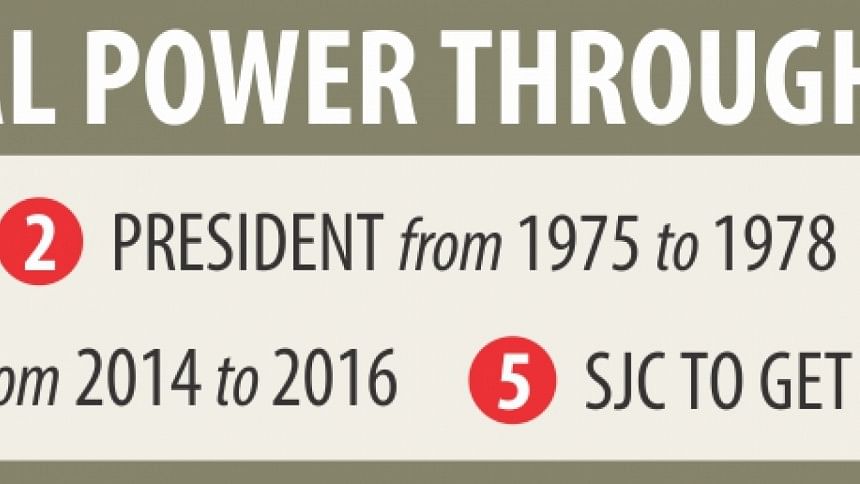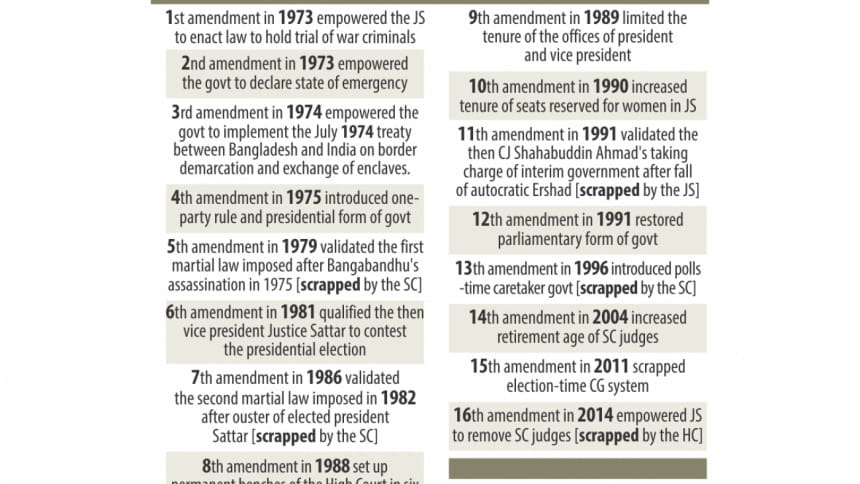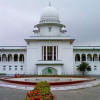Bangladesh HC scraps 16th amendment

The Jatiya Sangsad has again lost the power to remove Supreme Court judges on grounds of incapacity or misconduct as the High Court yesterday scrapped the 16th constitutional amendment that restored the parliament's authority.
The HC declared that the amendment is illegal, unconstitutional and against the principles of the separation of state powers and the independence of the judiciary.
It strongly criticised article 70 of the constitution that imposed tight restrictions on MPs in performing functions freely in parliament and lack of unity among political parties.
The amendment brought to the constitution in 2014 abolished the chief justice-led Supreme Judicial Council system which was introduced in 1978.
The HC ruling infuriated ministers and MPs, and some of them in parliament launched a blistering attack on the HC.
"The judgment is against the constitution. The High Court doesn't have the jurisdiction to deliver this verdict," Law Minister Anisul Huq told the House while placing a bill that proposed a hike in salary and allowances of SC judges.
He said the government would challenge the HC verdict at the Appellate Division of the Supreme Court next week.
Initially, MPs in both the treasury and the opposition benches opposed the bill when the law minister sought the permission to place it. They later allowed him to place it.
The main opposition, Jatiya Party, staged a walkout protesting the bill. They, however, returned to parliament after a few minutes.
Several ministers and MPs said the HC verdict undermined and humiliated parliament.
In its short verdict, the HC said, "The Commonwealth Latimer House Principles, 2003 about removal mechanism of judges, according to us, are best exemplified by the chief justice-led Supreme Judicial Council as incorporated in Article 96 by the fifth amendment to the constitution."
The HC order came more than a week after the cabinet approved a draft law specifying the procedures for the House to exercise the power to remove SC judges.

The cancellation of the 16th amendment has raised a question whether it would automatically reinstate the SJC in the constitution.
Manzill Murshid, counsel for the nine lawyers who filed the writ petition in November 2014 challenging the 16th amendment, claimed the SJC has been reinstated following yesterday's verdict.
Jurist Shahdeen Malik, however, opposed his view.
"The Supreme Judicial Council will not be restored automatically in the constitution. An amendment to the constitution is needed for that," he told The Daily Star.
In his view, there would be "a vacuum" until the re-introduction of a system for removal of SC judges.
The original constitution of 1972 had empowered parliament to remove SC judges.
But the fourth amendment brought to the constitution in January 1975 bestowed the authority on the president by abolishing the parliament's power.
During the first martial law regime, the then military ruler Gen Ziaur Rahman introduced the SJC in 1978 by amending the constitution through a martial law proclamation.
In 2010, the SC scrapped the fifth constitutional amendment that validated all activities of the first martial law regime. It, however, condoned the introduction of the SJC.
The then Awami League-led government retained the SJC and included the same provisions in the constitution through the 15th amendment in 2011.
But the AL changed its mind after returning to power through the one-sided January 5 parliamentary polls in 2014.
It moved to amend the constitution again and the House passed the 16th amendment to the constitution in September 2014.
HC OBSERVATIONS
A three-member special bench led by Justice Moyeenul Islam Chowdhury delivered the verdict by majority.
The two other judges are Justice Quazi Reza-Ul Hoque and Justice Md Ashraful Kamal.
Considering the significance of the matter, the HC bench issued a certificate to the government so that it can directly file an appeal with the Appellate Division, challenging the HC verdict.
Justice Moyeenul and Justice Reza-Ul ruled the 16th amendment illegal but Justice Ashraful declared it legal, Deputy Attorney General Motaher Hossain Sazu told The Daily Star.
During the hearing on the writ petition, the government defended the amendment.
In defence, Attorney General Mahbubey Alam and Additional Attorney General Murad Reza cited the practices in the UK, the US, India, Canada, Australia and few other countries where parliaments retain the power, the HC mentioned in its short order.
"But there is a fundamental difference between the lawmakers in those countries and those in our country. In the USA, the UK, Canada and Australia, the lawmakers are free to perform their functions in the parliament. No restriction like the one imposed by article 70 of our constitution exists in those countries," said the HC.
In India, however, there are some restrictions on the lawmakers; yet they don't blindly obey the party's decisions because of prevalence of democratic practice in the parties, it said.
"Keeping Article 70 of Bangladesh constitution as it is, the members of parliament must toe the party line in case of removal of any judge of the Supreme Court. Consequently, the Judge will be left at the mercy of the party high command," said Justice Moyeenul and Justice Reza-Ul.
"As regards Article 70 of the constitution of Bangladesh, we must say that this article has fettered the members of parliament. It has imposed a tight rein on them. Members of parliament cannot go against their party line or position on any issue in the parliament.
"They have no freedom to question their party's stance in the parliament, even if it is incorrect. They cannot vote against their party's decision.
They are, indeed, hostages in the hands of their party high command, said the two judges.
"It is easily comprehensible that in 63% Commonwealth jurisdictions, judges are removed from office for their misconduct/misbehaviour or incapacity without the intervention of the legislature.
"In examining the constitutionality of the sixteenth amendment, we cannot shut our eyes to the peculiar political culture prevalent in this country. It is common knowledge that there is no consensus about pressing national issues between the major political parties of the country.
"As a matter of fact, the major political parties are poles apart in this regard. Secondly, our society is sharply polarised. Thirdly, there may not be two-thirds majority of the party-in-power at all times."
Taking these factors into consideration, "we are of the opinion that the parliamentary removal mechanism may fizzle out in many instances. So, the allegedly corrupt or incapacitated judges of the Supreme Court will continue to be in office to the great detriment of public interest. We cannot lose sight of this aspect in any view of the matter".
They said a billion-dollar question has arisen: whether the 16th amendment has infringed upon the independence of the judiciary in public perception?
"The answer is obviously in the affirmative. In public perception, independence of the judiciary has been curbed by the sixteenth amendment.
"In any event, we must attach great importance to public perception when it comes to the independence of the judiciary. If according to public perception, the judiciary is not independent, then it cannot be sustained at all."
"The sixteenth amendment is a colourable legislation and is violative of the principle of separation of powers among three organs of the state, namely, the executive, the legislature and the judiciary and the independence of the judiciary as guaranteed by articles 94(4) and 147(2), two basic structures of the constitution and the same is also hit by article 7B of the constitution," the two judges ruled.

 For all latest news, follow The Daily Star's Google News channel.
For all latest news, follow The Daily Star's Google News channel. 








Comments